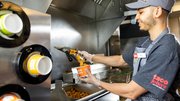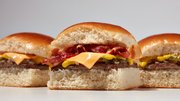Article
Focus on order accuracy the top priority for Fiesta Restaurant Group
Pollo Tropical removed some items from the menu to be more efficient and user friendly.

June 25, 2014 by Alicia Kelso — Editor, QSRWeb.com
Fiesta Restaurant Group’s Pollo Tropical turned in a 5.7-percent sales increase last quarter. Its AUVs are in excess of $2.7M. In a recent interview, CEO Tim Taft said a big driver of these results is the company’s focus on throughput.
"Everything starts with the product. But to get to our AUVs, we eliminated some of our products. We got rid of fajitas and fish. They were great products, but we had $6,000 ovens in all of our kitchens just for the fish," Taft said. "And it required additional training. It wasn’t efficient. Trying to be all things to all people is not efficient or user friendly."
In addition to a more streamlined menu, Fiesta Restaurant Group is also sharply focused on order accuracy. Taft calls accuracy "job number one" for the group’s brands, which also includes Taco Cabana.
"Everyone has accuracy problems, but when you improve those over the course of hundreds of transactions a day, well, it isn’t brain surgery. It's going to benefit your bottom line," he said.
The company took the worst performing restaurant in terms of accuracy, which was located in Dallas, and developed a training program around it. Now that training is "ongoing; it never stops," Taft said. Pollo also added order display boards on the consumer-facing side of the POS, to allow customers to communicate if something isn't right.
Through the eyes of the consumer
All of the company’s points of focus revolve around one goal, according to Taft: "Looking at everything through the eyes of the customer. That includes serving the best products, being friendly, being clean, having well-maintained restaurants and being accurate," he said.
Although technology advances will never replace these basic service tenants, it is an increasingly important factor, particularly with convenience in high demand. In response, Pollo Tropical plans to roll out a new online/mobile ordering app by the end of the year, as well as beef up its catering presence.
"Making things more convenient for customers is the future of restaurants. People want to eat at home or on the go. They have less time now," Taft said.
But there’s a catch, he adds. "The food can’t just be convenient. It also has to be good for you. You have to feel good about what you’re eating. These are the two big trends – feeling good about what you’re eating and having it conveniently available."
Catering growth
Pollo Tropical will try to leverage both of these trends through its fledgling catering program. Taft said the surface hasn’t even been scratched for the brand’s potential within this channel. Last year, catering grew by 25 percent, "and it’s still not a very big part of business," he said.
Pollo Tropical is developing a prototype for off-premise dining in Texas, which includes an off-premise manager, on-premise manager and a general manager.
"I think of catering as sampling of our food and that’s important because that’s our selling point," Taft said.
Competition
Pollo Tropical and Taco Cabana are also both involved in remodeling programs, which is a way for the brands to stay relevant and competitive, Taft said, adding that the restaurant industry has never been more competitive than it is now. In Atlanta, the company is even testing an offshoot of Taco Cabana, called Cabana Grill. Taft calls it a fast casual concept with a drive-thru.
"However, customers don’t see the difference between QSR and fast casual. We’ve always had drive-thrus in our system," Taft said. "There used to be limited, casual and fine dining. Now all of those lines are blurred. Where, before there were some gaps, those have been filled with fusion concepts. People who do it right – who make it convenient and stay true to who they are – are the ones who will succeed."
 ChatGPT
ChatGPT Grok
Grok Perplexity
Perplexity Claude
Claude








